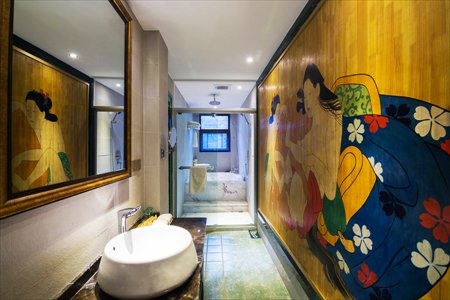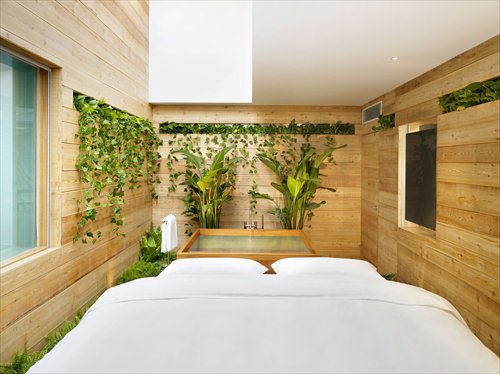

A room in Dhouse Photo: Courtesy of Dhouse

A room in The Emperor Photo: Courtesy of The Emperor
As China's tourism sector develops, new forms of accommodation are emerging. Many travelers now want something more than a mere room for the night, and are on the lookout for something special. Boutique hotels are stepping in to fill the niche, often using original concepts or artworks to attract visitors. Where once the star-rating reigned supreme, originality is now often a key factor instead.
Imperial style
Opened at the beginning of this year in the historic Qianmen area of Beijing, The Emperor is the second of two Emperor hotels, and is one example of a boutique hotel in China. Designed by US architect Adam Sokol, The Emperor has the theme of "water."
It is perhaps an ironic choice, given the northern city's desperate fight against drought.
While a basic function of a building is to prevent rain, The Emperor, however, turns this concept on its head by creating rain indoors.
"We came here three years ago, and this place, Qianmen, was full of dust," Sokol explained, adding that he feels water is important to the city and decided to go with the unusual notion of creating rain.
This concept is expressed in a multitude of ways.
For example, there is a so-called "rain alley" before the gate, which can artificially create rain as you walk toward the entrance. Astute guests will notice some steps leading to an underground water paradise, which is designed to be a cave-like spa center. And on the open balcony of the top floor, there is an open air swimming pool, making it easy to enjoy views of the city while also swimming. Also, the rooms are not marked by numbers but Chinese characters related to water.
Having completed a number of residential projects from apartments to single houses, Sokol has a particular interest in seeking projects "with a strong conceptual or experimental basis."
When approaching The Emperor project, he said he did not set a precondition that it has to look Eastern or Western, though many visitors have the feeling of well-combined cultures.
"You will see traditional Beijing grey bricks in the spa. However they are there not specifically to be Chinese but rather to create a feeling, and to help tell a story, which may not be Chinese but yet is still very much connected to China," Sokol explained. "I do think it is important, or even essential, to create something that can address itself even to its neighborhood, in some way. A project that fails to connect with people [and loved by the people] on some level will fail."
Not just a hotel
Sitting near West Lake in the ancient historical city of Hangzhou, Zhejiang Province, is Dhouse, another boutique hotel transformed from a local folk house. While the outside appearance is unremarkable with a white hall and grey tile roof, an architecture style common to many South Eastern Chinese towns, the inside is much more varied. The rooms come in a variety of themes from Bohemian, Mediterranean, Subtropical to more, and 10 famous views of West Lake are shown along the passageway, drawn both in the traditional Chinese style and Western style. With only seven rooms, Jiang Peng, the designer and one of the investors of Dhouse, said that they are currently doing it as a trial out of personal interest.
Besides tourists being customers, local residents can also hold birthday parties there or sing Karaoke, as there are rooms designed for such social activities. It is also available for art school students to use as a studio, said Li Yang, another investor.
Business model
The term boutique hotel became popular in the 1980s in the US and Europe, but it is still a new concept in China and represents a small slice of the market.
While most hotels have their gates facing the busiest street of the area, the entrance of The Emperor, on the contrary, sits in an alley. One has to make several turns from the main commercial street to find the hotel.
Liu Shaojun, chairman of The Emperor, said that he does not look at himself as just a businessperson, but regards what he is doing now as making something that "would not be criticized by our offspring."
"I once stood on the terrace [of The Emperor near the Forbidden City], and looked at that compound with humbleness and awe. I was shocked by [the wisdom] of our ancestors," said the man of 50, whose first Emperor hotel was listed on Forbes as one of the 12 that business people chose as the world's best hotels in 2008. "I did not dare turn my head to the other positions, for the rest could only be called buildings rather than architecture."
Li said he learnt this new perspective while studying abroad several years earlier. "China is developing rapidly now, but ideas are overused in many places," Li added.
Li believes that a major problem for boutique hotels in China at the moment is that "soft service is not professional enough." And at the same time "most Chinese tourists still believe more in luxury brand names."
Jiang has a similar opinion. He believes that the boutique hotel market is still in its infancy in China and many hotels prefer to stand out using elaborate stunts.
"Sometimes I myself think about this question: why did I choose a boutique hotel over a luxury five-star hotel? But we need to decide this in the beginning: Besides the special design, we need to explore some future trends, and the young people's changing demands and preferences," Jiang said. "We are still studying successful examples from abroad."
Copyright ©1999-2018
Chinanews.com. All rights reserved.
Reproduction in whole or in part without permission is prohibited.